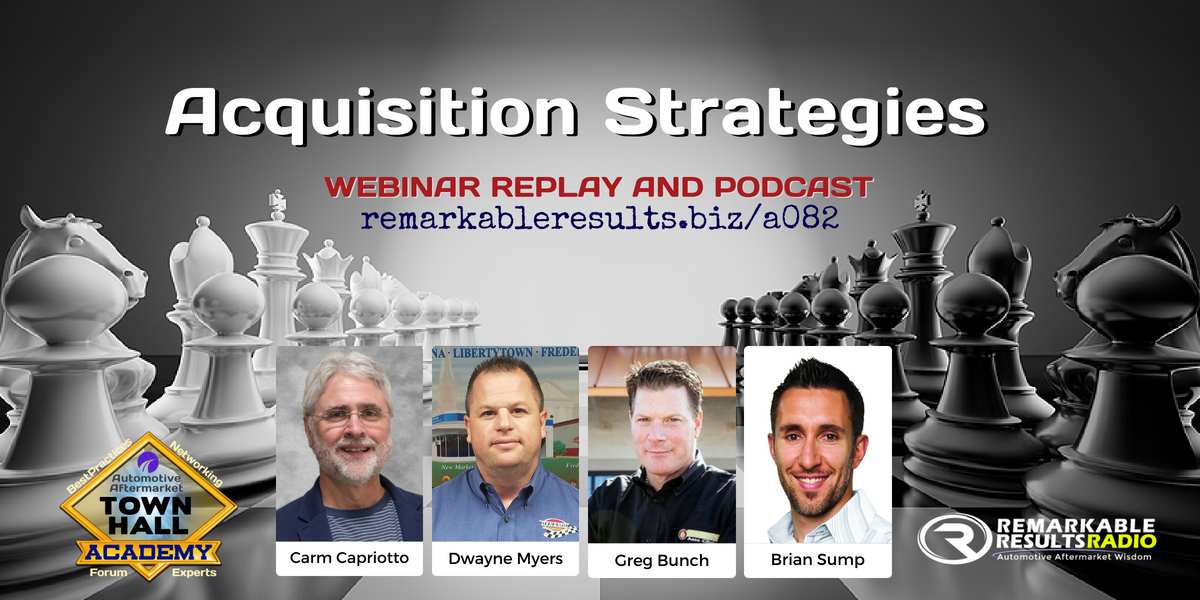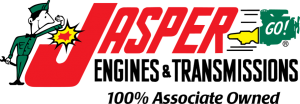THA 082: Acquisition Strategies

Your Learning Curve Never Sounded So Good
The Panel:
Greg Bunch is the owner of Aspen Auto Clinic, a five-location automotive and service business in Colorado. Greg started his passion for cars at 15 when he began rebuilding a 1966 Volkswagen Bug. Greg has moved from a Volkswagen mechanic to ASE Master Technician, to Management, to starting his shop 18 years ago in his garage, to an award-winning multi-location business.
Greg is currently a board member for the STEM-based charter school call “Automotive Institute of Science & Technology” and on the Advisory board of Ratchet and Wrench Magazine. Greg is also a board member of the Autocare organization and a certified instructor for the Worldpac Training Institute and Carquest Technical Institute. Greg’s unwavering passion for the industry has also led him to form a company called Transformers Institute, a coaching and training company dedicated to transforming the automotive industry. Listen to Greg’s previous episodes HERE.
Transformers Institute HERE.
Dwayne Myers is a partner in Dynamic Automotive in the greater Maryland area. Dwayne invests time in the industry with the Auto Care Association and serves on the education committee with CCPN (Car Care Professional Network). Dwayne was recently honored as one of only 17 outstanding individuals that qualified for the prestigious 2017 World Class Technician Award presented by The Auto Care Association and ASE. He is very passionate about hiring and sustaining a strong and engaged team. Listen to Dwayne’s previous episodes HERE.
Brian Sump is not your typical shop owner. A former professional athlete, Sump had never turned a wrench in a shop before starting Denver-based Avalon Motorsports in 2007. But in the years since, he has used his business acumen and a detailed, process-based management philosophy to grow the German-specialty shop into what a number of industry consultants consider to be an industry leader. Listen to Brian’s previous episodes HERE.
Key Talking Points:
- Team Building before you start your next branch is critical
- You need to build your team. Have your team train their replacements. Decide ahead of time who’s going to lead the new shop or old shop. You cannot run both at the same time. Develop some sop so you can open a new location quickly.
- Confidentiality
- Loose lips sink ship. The more people that know your plans the more expensive it will be! Keep your mouth SHUT!
- If you use a broker you will sign a Non-Disclosure Agreement. (NDA)
- If people know you are in acquisition mode dollar signs get in people eyes.
- If you tell your key people you must have trust or have them sign a Non Disclosure Agreement (confidentiality).
- How do you get a lead?
- Tool trucks, parts reps, relationships built through local ASA or similar events, old school banging on doors, asking realtors or brokers.
- Brand your company that you want to grow. Tell people. Tell your team. Shop owners that are ready to sell will find you. Their realtors will find you.
- You may get a lead because of your reputation and culture in the community and industry, where you can offer an opportunity to the new employees over the big box acquirers.
- Another big factor is that the seller’s customers will be well taken care of and relationships will be valued.
- If you buy through a broker plan to pay more because they have a cut of the deal.
- Discussions with your accountant.
- Layers are paid to say no, however they must read every contract or agreement you sign.
- Accountants are uber conservative. You need to listen but they do not know your industry as well as you. Their advice is important but put it in context.
- Your set your books need to be straight up. You need to know what’s working right and what’s not.
- You also need to talk to your bank. You need a strong relationship so they can react as fast as you need them too. The deal that has money at the ready wins.
- Also, work with your banker on a potential SBA loan. Buyer beware not all banks have a seamless relationship with the SBA.
- Do you scout for property or hire a realtor.
- Many found our house by driving through neighborhoods. There are strong regulations on buying homes. The commercial real estate does not. Gloves are off and you must be very careful about what you are buying. Leases, environmental, and having a high level commercial real estate person should be on your team.
- The purchase price of the business and the lease value or property value are factors in what the buyer leaves with. You may consider the entire deal structure together.
- Dwayne Myers always uses a realtor.
- If you own property you can always leverage the asset value in your growth, however, leasing building is also OK moving forward, but know what is in your lease.
- You can add the first right of refusal in a lease agreement to buy the property if it goes on the market.
- Approach a current owner.
- Dwayne likes them to come to him, but he knows people that have and were successful at it.
- Greg uses his supplier network to set up a lunch meeting with possible acquisitions.
- Be real and fair to get an honest conversation.
- Use restraint when you see numbers. Do not create a hurt relationship. It may take time for the seller to recognize the quality and value of your offer.
- If you do not get the deal today, you may have a chance down the road to approach it again.
- Be patient. If you have patience you are in the driver seat. These tactics is not to be dismissed. It is one of the most important parts of making a deal.
- Negotiations. Challenges. Either business or property.
- Books recommended by the team.
- Never Split the Difference: Negotiation As If Your Life Depended On It by Chris Voss
- Rocket Fuel: The One Essential Combination That Will Get You More of What You Want from Your Business by Gino Wickman and Mark C. Winters
- Books recommended by the team.
-
- Dwayne believes everything is negotiable and sometimes it’s good to buy the land and other times renting will still make you a nice profit. If you don’t have the funds to buy the property set up a deal where you buy the business, maybe owner financing (win/win), then have it in the contract in 5 years you can purchase the land.
- Sellers have their blood sweat and tears in their business and feel that their business is worth more unless the numbers prove it out.
- You can ask for owner financing. It is a win for you if they say yes.
- Due Diligence. A comprehensive process.
- Discovery of all financial information, processes, procedures, payroll, systems, job descriptions, 3 month past due financials.
- If you get the information quickly that tells you something, if it takes way too much time, that tells you something.
- Many sellers are overwhelmed with the request for the comprehensive nature of the due diligence process.
- Discovery of all financial information, processes, procedures, payroll, systems, job descriptions, 3 month past due financials.
- Any trouble normalizing a P&L from an acquisition?
- You must discern where the money is going.
- If you are not great at understanding P & Ls and chart of accounts get help to best understand the real expenses, revenue, and margin.
- Apply your common sense to what you discover.
- A broker’s overview will have a ton of information.
- Point of sale information is not what you are looking for.
- Decide start-up costs. The 1st year can be a mess but work to get it normal. Expect a loss but you should project out so you have a plan to be profitable.
- Financing ideas. Do you have a more in-depth perspective on this?
- Brian just went through SBA pre-approval, he said the SBA just went through changes.
- Every bank handles SBA differently. Some have different lending parameters. Do your research.
- Traditionally banks do not want to lend on a business acquisition. The SBA takes the risk from the bank.
- Down payment structures and payment structures are designed to make the deal work.
- Be prepared to have cash or liquidity to do the deal, at a minimum of 10%.
- Greg says the SBA is for small business but it can be a painful process.
- Dwayne has never done an SBA. He believes in community banks vs. big national banks because of regulations.
- If you have an existing shop with an owned property that has equity you can cross collateralized the assets to come up with the down payment.
- Dwayne loves owner financing too!
- Brian just went through SBA pre-approval, he said the SBA just went through changes.
- Many businesses go out of business not because they are not profitable, but because they run out of cash. Preserve cash always.
Sister episode Town Hall Academy 075: ‘Am I Ready For My Next Branch?’ HERE.
Town Hall Academy 040 on SWOT- Strength | Weaknesses | Opportunity | Threats mentioned in this episode HERE.
Facebook Twitter Linked In Email
This episode is brought to you by Jasper Engines & Transmissions. When a car’s engine or transmission fails, it’s not the end of the road. A remanufactured drivetrain product from Jasper Engines & Transmissions will give your car a new lease on life. JASPER has over 2000 Associates, three manufacturing facilities, two distribution centers, and 45 branch offices across the country. They’re all working to produce, transport and deliver the perfect product. That’s what they do best… keep customers happy. Visit jasperengines.com
not the end of the road. A remanufactured drivetrain product from Jasper Engines & Transmissions will give your car a new lease on life. JASPER has over 2000 Associates, three manufacturing facilities, two distribution centers, and 45 branch offices across the country. They’re all working to produce, transport and deliver the perfect product. That’s what they do best… keep customers happy. Visit jasperengines.com

About the author, Carm Capriotto, AAP
Carm is the founder and host of the Remarkable Results Radio Podcast and the pioneer of automotive aftermarket podcasts. Carm calls on his years of experience in the aftermarket to bring engaging stories from his guests.
Listen to raw, unfiltered, honest, and sincere stories that include insights, trends, best practices, and expertise. Each interview brings an opportunity to learn one new thing through the stories of personal achievement. Many podcast guests tell their story of transformation from working in their business to working on it.
As host of over 1,000 episodes, Carm uses his enthusiasm and passion for the aftermarket especially the service sector to take his listeners on a journey showcasing successful service professionals’ paths to Remarkable Results. He also enjoys interviews with aftermarket industry thought leaders who bring their industry perspectives to his listener.
Follow the podcast on your favorite podcast listening app and always listen to learn just one thing!


